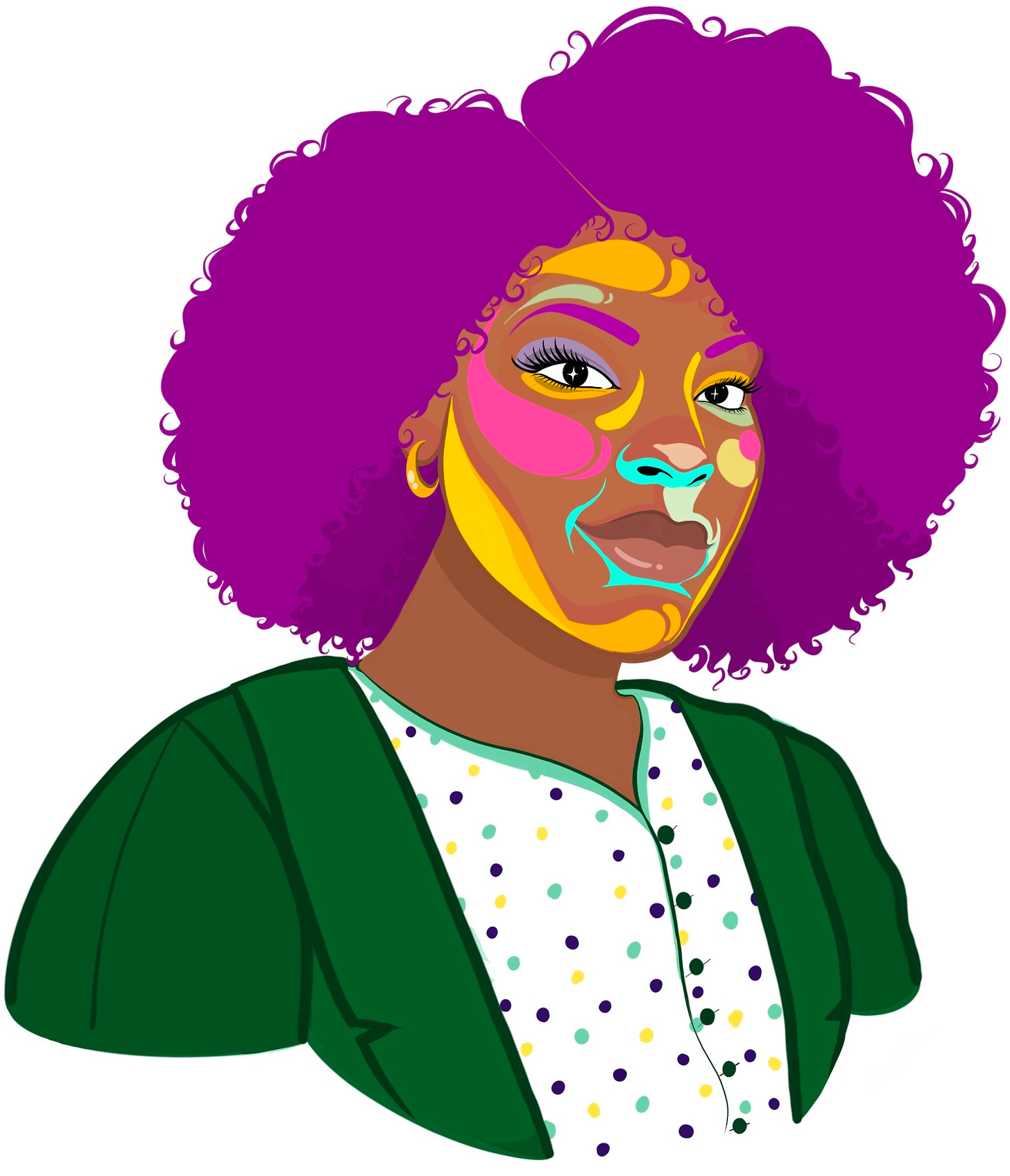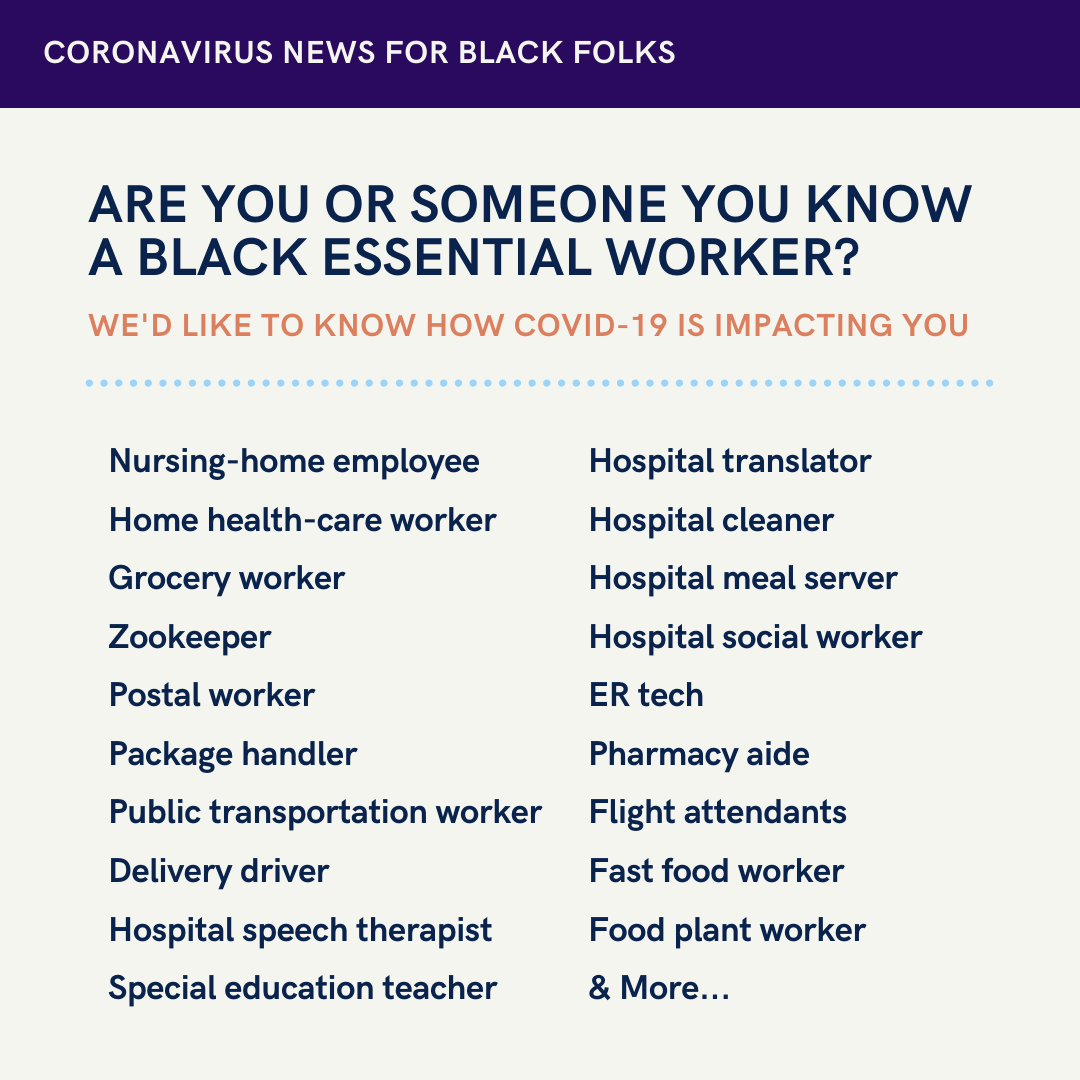Essential & Black: A Pregnant Hospital Worker in Delaware Who Prefers Work to Home But Feels Invisible
"...I haven’t seen any representation of Black front line workers in the media."
Speak Patrice Presents: Coronavirus News for Black Folks is an independent newsletter by journalist Patrice Peck. I’m aiming to empower our community by sharing coronavirus (COVID-19) news and stories as they relate to the Black Diaspora.
Please consider (1) clicking that itty bitty ❤️at the top of this email next to my name to “like” us, (2) subscribing, and (3) supporting this newsletter by sharing it with friends and family.

Illustration by Candii Kismet for Coronavirus News for Black Folks
Amid global social distancing efforts sparked by the coronavirus outbreak, select businesses and services deemed essential have remained open to keep our society functioning. Many of these jobs are often low-paying with little-to-no benefits and mostly performed by Black and brown women. “Essential & Black” is an ongoing interview series that spotlights the Black essential workers risking their lives to protect ours and to support themselves and their loved ones during this pandemic.
Who: A 29-year-old Black American woman who lives in Wilmington, Delaware with her partner and two male roommates. She’s 20+ weeks pregnant.
Essential job: She’s a food service worker at a hospital where she’s worked for four years.
Location: Delaware.
Work schedule: She typically leaves for work at 7:00 AM and her workday ends at 4:00 PM, with her shifts varying from five to eight hours.
(Editor’s note: The New York Times published a relevant article on how the coronavirus is disproportionately impacting New York City’s non-medical hospital staff, most of whom are Black and Brown people: “3 Hospital Workers Gave Out Masks. Weeks Later, They All Were Dead.”)
“My job is really not that difficult compared to the other jobs in my department. It's mainly me sitting in a small call center office doing customer service type work, taking calls from nursing staff or parents ordering food for patients and dietitians asking questions. I am responsible for feeding the entire hospital, so things can get chaotic.
My job does not require close patient contact, so I think my chances of being infected with COVID-19 are low. I feel somewhat safe, but there’s always fear in the back of my mind. The hospital has done a pretty bad job of tracking who's like being tested or passing that knowledge on, so I'm mainly worried about my coworkers because a lot of them have been delivering meals into rooms with patients who later test positive.
So I worry about getting infected. But I don't think that's happened. Plus, every employee takes a four to five question health survey when they walk in the building, and we have our temperatures taken and are given a mask. But I still feel a lot of anxiety when I’m going to work and immense relief when I leave work. When I get home, I really don't want to do anything but rest, take shower, and cook dinner — I barely even want to cook dinner. Then I wake up and do it all over again. ”
“…when the hospital first started testing patients for COVID-19, we weren’t even told anything.
“I believe we have had 22 hospital associates and 12 patients test positive for COVID-19, as of today. Patients and associates are often sent home for quarantine, and the associates return to work once they are asymptomatic. But when the hospital first started testing patients for COVID-19, we weren’t even told anything.
We were walking into rooms without any PPE. Weeks went by before the decision was made for only nurses to go in these patients rooms with the correct PPE. Food service staff was restricted from these rooms due to the PPE shortage. This is how it should’ve been from the start. My coworkers and I felt that we don’t get paid enough to take these risk.”
“I feel like I have to work because I don't make much money, I'm expecting, and I need to start saving and preparing. A coworker and my mom both suggested that I stop working in the hospital because it could be risky, like I could get the virus or something bad could happen to the baby. They suggested that I go on unemployment, but I just don't think my job would still be there after all this is over. So I didn’t take that chance. It just didn't make much sense to me.
Plus, if I did have the choice to just stay at home, I don't think I could do that either because I’d probably end up feeling depressed just being at home every day. Even on my days off now, I would rather be out doing something but I can't go nowhere. So might as well be at work making money.”
“I make less than $30,000 a year, not including taxes.”
“Working in food service, you make the least amount of any associate in the hospital. I make less than $30,000 a year, not including taxes. It’s not a bad wage; it’s somewhat livable. But almost all of my coworkers are living paycheck to paycheck, myself included. You either need the income of a spouse or a second job to pay all your bills. I do live with my boyfriend and he works full time too. Somehow his job has been classified as essential, so he's able to work. But we don't make enough money for all of the bills we have and to also save for a child.
So my motivation is to work these hours that I can to make what money I can make so that I can try to save and to pay all my bills. I'm not a nurse or a doctor. I'm not out here like saving lives. I don't mean to downplay my job because my work helps to keep the hospital running, but I work because I have to. I need the money. That's about all that motivates me.”
“Before all this started I was a little stressed about being pregnant, but I think it was just normal stress being that this is my first time being pregnant. I was even fine with having to go to all these appointments by myself. But then I started hearing that some states were making women give birth alone, which is horrible. No one should have to give birth alone.
I did get scared earlier in the pregnancy when I thought I was having a miscarriage, so now I just try to keep my stress down. I feel like if I'm relaxed and calm then everything should go smooth, hopefully.”
“…I haven’t seen any representation of Black front line workers in the media.”
“My biggest fear is passing the virus to my mother. We used to see each other at least twice a week. I haven’t seen her in months and she’s very upset. We are close. It’s scary. No one wants to get sick or be responsible for making a loved one ill. But millions of people are jobless right now, so I’m grateful that I still have a job.”
“This virus has really highlighted the fact that Black frontline workers, no matter what job they have, deserve a higher living wage. Still, I haven’t seen any representation of Black front line workers in the media. I feel invisible.”
—
MORE ESSENTIAL & BLACK:
A Security Guard in Harlem, NY Who Feels Betrayed By Her Employer
A Pharmacy Technician In Rochester, NY Who Lives Paycheck to Paycheck

WE WANT TO SHARE YOUR COVID-19 PANDEMIC EXPERIENCES:
Are you a Black essential worker? Are you on the front line of the pandemic? Would you like to share your story for a potential feature in the newsletter?
Submit your story here: https://forms.gle/UTGTD9i9mXG1oNwY6
Not an essential worker? We still want to hear from you! Do you have an interesting story to tell about life during the pandemic?
Submit your story here: https://forms.gle/ygicBGtUYPrnJRUL7
Thank you to all of the essential workers, especially non-medical hospital employees and other overlooked workers on the frontline, who are helping to keep society up and running.
Stay safe and take care ✊🏿💗




